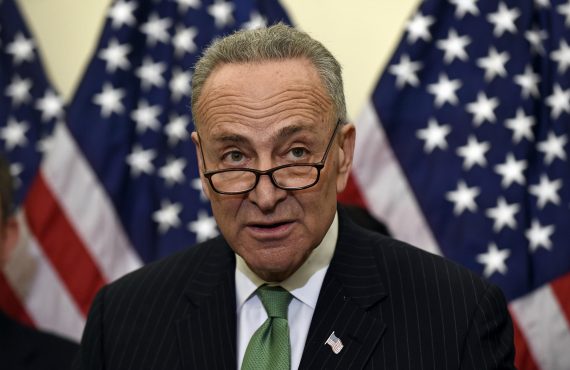New Senate Democratic Leader Regrets Supporting Filibuster Reform
The new leader of the Senate's Democrats says he regrets supporting the filibuster reforms his party passed in 2013.
Senator Chuck Schumer, who is spending his first day on the job as Senate Minority Leader now that Harry Reid has retired, says he’s come to regret the Democrats’ decision to use its Senate majority in late 2013 to repeal the filibuster for Executive Branch and Judicial nominations below the Supreme Court:
Sen. Chuck Schumer lamented Tuesday the Democrats’ move to diminish the number of senators needed to confirm Cabinet picks from 60 votes to 51, because the new rule now hurts his party.
“I argued against it at the time. I said both for Supreme Court and in Cabinet should be 60 because on such important positions there should be some degree of bipartisanship,” Schumer, a New York Democrat and the incoming Senate minority leader, told CNN’s Dana Bash. “I won on Supreme Court, lost on Cabinet. But it’s what we have to live with now.”
In 2013, then-Senate Majority Leader Harry Reid and other top Democrats became convinced GOP delaying tactics were crippling Washington. They triggered the so-called “nuclear option” which — over the objections of Republicans — lowered the threshold to overcome a filibuster from 60 to 51 votes.
“Wish it hadn’t happened,” Schumer said.
Senate Democrats have vowed to stall action on eight of President-elect Donald Trump’s Cabinet nominees who are focused on implementing his economic, law enforcement and regulatory agenda, a senior Democratic aide told CNN Monday.
Schumer’s remarks come at the same time that many Senate Democrats, and Democrats outside the Senate, have expressed reservations about several of President-Elect Donald Trump’s nominees for Cabinet positions. Earlier this week, it was reported that Senate Democrats plan to “target” eight of those nominees due either to their records outside government or the views they have expressed. Most notable among that group of eight are picks such as Rex Tillerson, Trump’s choice for Secretary of State, Jeff Sessions, who has been selected to become Attorney General, and Tom Price, a long-time critic of the Affordable Care Act who has been selected to become Secretary of the Department of Health and Human Services. We can expect to see tough questioning of these nominees before the respective committees handling their nominations over the next three weeks, and vigorous debate over their nominations on the Senate floor. However, when it comes time for a vote the Democrats will have no options available to them thanks to the fact that the changes that Democrats adopted in November 2013 effectively ended the filibuster for nominees to all Executive Branch positions, as well as Judicial appointments below the Supreme Court, certain military promotions, and Ambassadorships. This means that, barring some kind of unlikely scandal that uncovers information about a nominee that is more than just a minor embarrassment, all of Trump’s Cabinet and other Executive Branch appointments will be confirmed relatively easily.
Schumer’s regrets are one reason why complete repeal of the filibuster, or indeed any change beyond what the Democrats accomplished in November 2013, is unlikely. While the rule is a inconvenience for a party that is in power at any given time, and often a major one, there is enough institutional memory in the Senate, and control has changed often enough in recent years, that member are well aware of what the consequences of complete repeal would be. Effectively, complete repeal of the filibuster would mean would turn the Senate into a smaller version of the House of Representatives, which it clearly was not intended to be. Instead, the Senate was intended to be something of a check and balance against the popular will as manifested in the House of Representatives. This is one of the reasons why, in the original plan under the Consitution, Senators were selected by the state legislatures rather than via popular vote. It was believed at the time that selecting Senators in this manner would mean that the body would be a more deliberative body that would serve as a method for cooling off the passions of a House of Representatives more likely to reflect the passions of populism due to the fact that its members were directly elected by the people. While the method of selecting Senators changed with the ratification of the 17th Amendment, the Senate’s role as a check against popular will did not and protections for the minority such as the filibuster help to emphasize that role. Additionally, the filibuster exists in no small part due to the fact that the majority maintains tight control over the agenda of the body and that, without the filibuster, minority members would have virtually no voice despite the fact that they may represent a significant portion of the population of the nation. Finally, as I’ve noted in the past, changes in control of the Senate have been frequent enough, and turn around is low enough, that members who are now in the majority remember what being in the minority was like and vice versa. That’s one reason why it took nearly four years for Harry Reid to take the steps he did in November 2013 and why they were limited to very specific circumstances. Anything more likely would not have gotten a majority of Democratic votes, and as it was even the modest reforms he put on the table back then. As it was, the reforms that did pass saw three defections by long-serving Democrats who advised against filibuster reform due to the fact that it would hamper the party’s ability to act when it inevitably returned to the minority. Now that this has happened, and especially in an era with a Republican Congress and Republican President, the Senators who voted for that reform are living to see the consequences.







The Democrats were right to repeal the filibuster. The Republicans had changed it from a rarely used emergency measure to something used on virtually every bill or approval. It had gotten to the point that the press regularly reported that passage of a law or confirmation of an appointment required 60% approval in the Senate, rather than the 50% + 1 required by the constitution.
And I don’t believe for a minute that the GOP would have kept the filibuster alive once they had a Republican president. They started using it for purely partisan reasons, guaranteeing that the Dems would treat it the same way. The Dems would have been fools to keep it, since the Republicans would just think them fools and change it the first time they met with obstruction on something they considered important.
As a rule of thumb, the President should be able to get his or her nominees confirmed — no filibustering, no inordinate delays (I would happily accept a ruling that the Senate has 90 days to reject, otherwise they are appointed).
I don’t care whether the President is a Democrat or a Republican, they should be able to staff their administration.
Some of Trump’s nominees should be rejected — but they should actually get a hearing and a vote and be rejected by a majority of Senators. Or the Republican Senators can own the nominees and their problems.
Judicial appointments are different, but apparently there is now just a policy of delaying forever or not even deigning to hold hearings. But, with holds, quorum calls, etc, the minority can still slow the Senate to a crawl to delay nominations.
No regrets whatsoever. Republicans effectively filibustered the Obama presidency for 6-plus years.
As “MarkedMan” said above, it had to be done.
Now they have the floor, and I most certainly do not wish them well.
@MarkedMan: What really bugged me was that the supposedly liberal MSM would routinely report that some measure failed in the Senate by a vote of 55 to 45, or whatever, without mentioning that the 55 votes were for the bill.
One interesting exercise would be to determine how much of the population is represented by Democrat vs Republican senators. Take the population of each the state and add to the column of D or R, or split it equally for split states. We could easily discover that a minority of senators represent the majority will.
@MarkedMan:
You mis-spelled Democrats. They started us on the road to this first under Nixon and then under Reagan and Bush II especially.
(Cue response of ACK! YOU BOTH SIDES DO IT YOU MONSTER!)
Like with almost everything…Schumer is wrong.
I regret him almost as much as I regret Trump.
@C. Clavin:
Schumer is just a horrible face for the Democratic Party. But until I hear otherwise, Barack Obama is the moral leader of the Democratic Party. I hope he will take on the role. The faces I think we want in front are Obama, Warren and possibly Kamala Harris. Bernie if he can sing in tune.
Umm, that is ever so slightly disingenuous…as this chart shows, it is Republicans who have really abused this measure over the past few years compared to what happened in the past…so sorry to burst your “both sides do it” bubble…
@Rick Zhang:
Since the Senate was never intended to be based on population, but a forum where each of the states was represented equally, this observation is irrelevant.
Also, I would remind you that this feature of the Senate is not going to change. Article V of the Constitution, which deals with Amendments, provides that any Amendment that would change the Senate to one where some states had more representation than others effectively requires the consent of all the states in the Union. The odds of that ever happening are somewhere between slim and none.
@Gustopher:
”
I generally tend to agree, which is why I don’t really have a problem with the November 2013 filibuster reforms at least as far as they apply to Executive Branch appointments.
@michael reynolds:
Obama is still extremely popular (even among many Trump voters), and deservedly so. But my guess is he’s going to take a break. And I can’t say I blame him.
@Gustopher:
I disagree. Many of the positions are too powerful to leave to the discretion of one person, whether that person is elected or inherited rule.
@An Interested Party:
Talk about disingenous. Extend that graph to before 1979. You’ll see that it started spiking up under Nixon, then Reagan. It was the Democrats who started this business of routinely filibustering judicial nominees.
It has been used more under Obama; I’m not denying that. OTOH, Obama has tried to pass more dramatic legislation than before and with less bipartisan support.
What goes around comes around.
@Gustopher:
I tend to agree.The GOP filibuster of Garland was disgusting. Legal and constitutional, but disgusting and against the spirit of the law.
i guess he bought into the “end of the gop is in sight” bs that was quite popular in the past few years.
“elections have consequences” – the gift that keeps on giving.
@george:
Yes, but that is why the Senate holds hearings and votes to confirm or deny these appointments — Tiller and Carson should be asked “Why are you here?”, Perry should be asked “What does the Department of Energy do? Did you know it did that when you wanted to close it? Do you still want to close it?” Hard questions that would help establish whether they are the right people for the job.
But, there’s no reason to require a 60 vote majority to confirm them — if a Republican congress confirms the obviously terrible, the Republican congress owns the obviously terrible.
If he wants to maintain any significant part of his legacy, rather than taking a break he should follow through with his plans with Eric Holder to win back state legislatures for Democrats…
No, of course you couldn’t…from your own link…
In other words, even though both sides have used the filibuster, it is Republicans who have abused it extremely…and that abuse has little to do with “dramatic legislation” from the president when talking about routine judicial appointments…
And let’s not forget that no Democratically-controlled Senate did to a Republican president what Mitch McConnell did to Obama regarding Merrick Garland…
@Gustopher:
Sadly no, the whole country ends up owning the obviously terrible. We’ve gotten used to the idea of government as a team sport (us against them), and by “used to” I mean for the last century and a half at least (some of what what said in the 19th century makes today’s partisanship seem tepid). But ultimately the only team involved is the whole country, and the people running it don’t just affect the party in power.
The point of a 60 vote majority is that its much rarer for one party to get that many, so you’re forced to compromise. Its why, in Parliamentary democracies such as Canada, minority governments (ie the ruling party needs votes from at least one other party) are almost always the best.
@Hal_10000:
You know, you really might want to drop your partisan blinders, and try looking at that graph again. That spike in the number of motions to end filibuster under Nixon? Those were REPUBLICAN filibusters. You can tell, because the bars are gray, indicating split control of the Senate and Presidency. And last I checked, Nixon was a Republican, which means the Senate majority party was Democratic. So as became usual, the Democrats were actually trying to govern and get stuff done, while the Republicans tried to do whatever they could to prevent any governing from happening.
Unless of course you think the Democrats were filibustering themselves.
@Hal_10000: And if you want to analyze filibusters of nominees, you should also be looking at the relative quality of candidates respective presidents have put up. I mean, Jeff Sessions? Seriously? And Trump’s nominees are not outliers. The last Republican president seriously thought Harriet Miers belonged on the highest court in the land. But sure. Democrats started it. Like that time they put the former head of PETA in charge of the Department of Agriculture. Oh, wait…
@bill: It’s funny that you should mention that considering that you are as likely as anyone to not like the “gifts” that are coming.
@Doug Mataconis:
So what? Members of the Senate were originally selected by the state legislature. This was later changed to be popularly elected positions. Our system of democracy continue to evolve, and while I admit that changing the system is harder than e.g. in the UK, which doesn’t have a written constitution, it doesn’t mean that people can’t continue to try.
On a grander scheme, I’m of the view that the left should play hardball and ramp up the degree of partisanship in the country. Tit for tat, in other words. Just as Republicans spread slander to plant seeds of doubt among a notable minority of the country that Obama is an illegitimate president, so can the left do the same to Trump.
This involves doing, in a similar but much more reasoned fashion, as what trolls on the right like Guarnari are doing. Continue to hammer away at Trump for being a minority president elected under an outmoded scheme that is not representative of the country. Say something often enough and enough people will end up believing that it is really a scandal.
As a follow-up, I would encourage everyone to read this article on the Polish experience with populism: https://www.project-syndicate.org/commentary/lesson-of-populist-rule-in-poland-by-slawomir-sierakowski-2017-01
If Trump follows through with half of the populist playbook, he will have violated many established norms about politics in this country. This will mean our institutions degenerating into those seen in banana republics. The rich will enjoy private security and gated complex, becoming fabulously wealthy through corruption.
The most serious violation is in how populists view elections: “Electoral dictatorship. Populists know how to win elections, but their conception of democracy extends no further. On the contrary, populists view minority rights, separation of government powers, and independent media – all staples of liberalism – as an attack on majority rule, and therefore on democracy itself.”
In other words, democracy is fine when I win, but when parts of it is inconvenient to me I will complain that it is unfair. Sound familiar?
I’ve long been an advocate of Democrats rolling over and letting Trump and the Republicans ram their agenda down the throats of voters. This means tax cuts for the rich, a trade war with China/Mexico, a new understanding with Russia with regards to Syria, Ukraine, and the Baltic states, cutting social security, and revoking health care for millions. Let these things happen and there can be no mistake who voters will blame in the next election when their lives are even worse than they are today. By filibustering some of these things, Democrats instead generate more enthusiasm among conservatives and keep the country tottering along. Take a tactical step back, let a major recession happen, and let the people feel the pain of their choice. The country may be worse off for it in the short-run, but we’re interested in the preservation of the island of classical liberalism amidst a sea of rising populism.
@Hal_10000:
Well yeah…when Republican reflexively vote en-masse against Republican bills (Obamacare, infrastructure, etc.) that is bound to happen.
@michael reynolds:
Please, please, please do that !
Trump is again lying to cover for his puppet-master…
Trump on Twitter:
The truth from CNN:
And from the Times:
Is Trump being blackmailed in some way and forced into supporting Putin? (he owes over $600M to China…how much does he owe to Russia?) Is he just an innocent Putin patsy? Or is he just an insecure buffoon who is afraid to admit to anything that undermines his egomania?
@Just ‘nutha ig’rant cracker: yeah, like all you soothsayers and your petulant whining about how the stock market will drop if trump wins ( up 1400pts since) and he’s not even in office. i’m sure obama will try to take credit for the rise but we all know he had nothing to do with it as he stopped “presiding” years ago.
and take note that manufacturing jobs are coming back here vs. mexico. and obama had 0.0 to do with that, he said so years ago.
but i guess a “working middle class” is bad for liberals as they won’t need to vote for their entitlements anymore!?
@bill:
WTF…a couple thousand jobs?
Are you serious?
What a moron…
@bill:
Obama saved 1.5 million jobs with the auto bailout.
Trump might have saved 700 jobs (Ford says that’s not true).
But Obama is black…so to bill 700 > 1.5M.
I don’t know what bill does for a living but I hope to hell he’s a middle class worker; their lives will be ruined by the cutting of regulations and protections…the rust belt will soon be just like Mexico…just colder.
@bill:
You know what, Bill? You’re absolutely right. Everything is going to be great now. Your president is cutting my taxes by just a crazy amount. Low six figures, depending on where the corporate rate comes in. That’s what Trump’s doing for me.
And what is it he’s doing for you? Oh yeah: killing your health insurance and turning the economy over to. . . wait for it, ’cause it’s funny. . . Goldman Sachs! You know, the ones Hillary spoke to and it was the worst thing ever? Yeah: they run the economy now. Aren’t you thrilled? They’re going to take away your health insurance, your medicaid, maybe even your Social Security all so that they can make me richer.
Isn’t it beautiful? Aren’t you excited? I mean, excited for me? I’ll get richer, Trump and his cronies will get richer, Vladimir Putin will get richer and you, Bill? You’ll get f–ked, and whereas in the past I’d have felt sorry for you and wanted to help you, I am now free to not give a single sh-t about you and people like you.
I am sorry, I hate all the policies that are about to be reversed and the terrible policies that are about to go into effect, but elections have consequences and Trump can name the people he wants to misrule and the Senate should advise and consent on the basis of a majority vote. Debate, use delaying tactics, make sure the embarrassing facts are known and that these Republican senators own these people, but elections have consequences. Schumer screwed the pooch the last two election cycles, particularly the last one and ran retreads or feckless candidates against Ron Johnson, Pat Toomey, and Marco Rubio. That and James Comey left Mr. McConnell the majority leader. Maybe Democrats in national leadership should start worrying about building the party in the rest of the country.